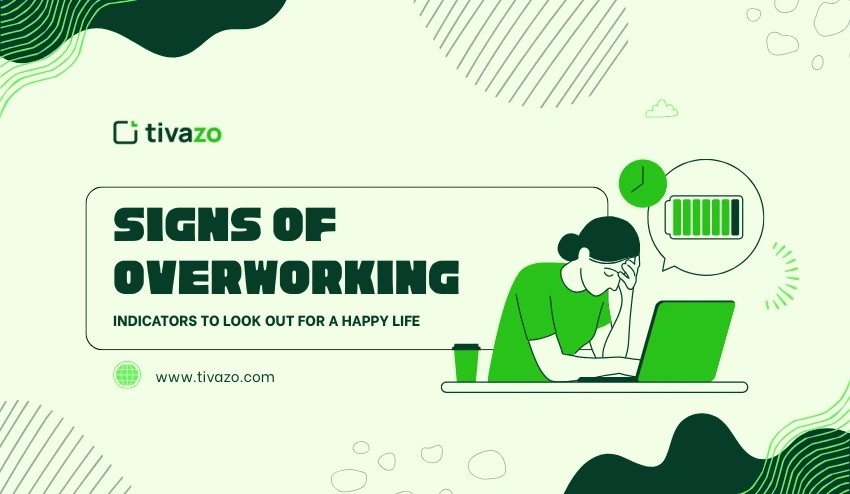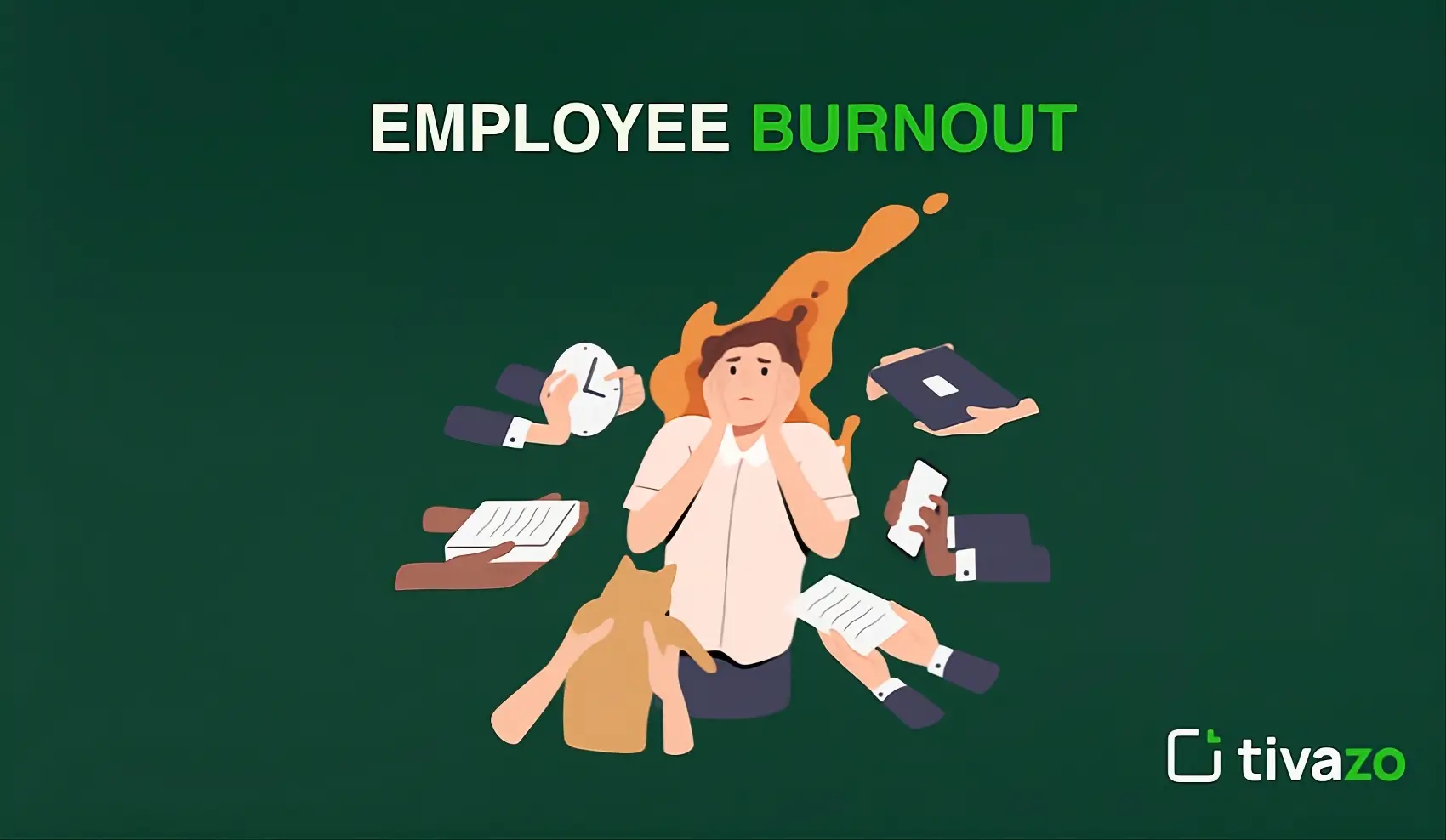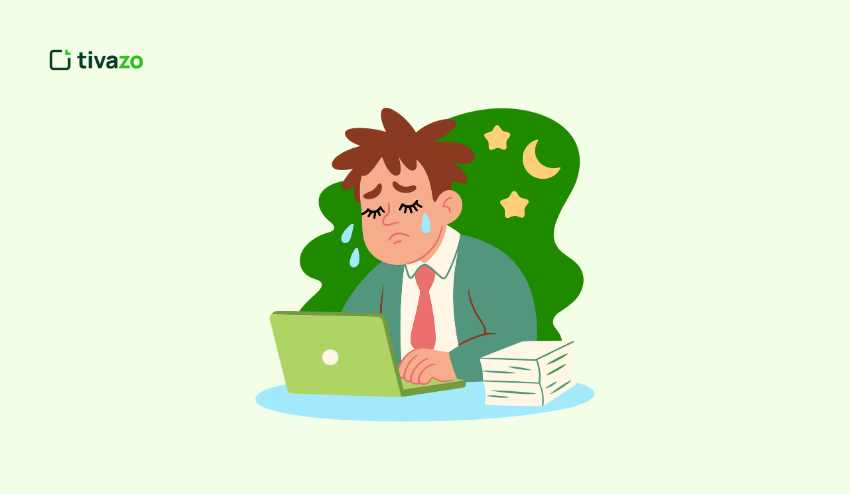Have you ever experienced the burden of a never ending to-do list, where the hours feel too short to complete your work? Overworking is more than just working late; it is an unnoticed epidemic that affects your mental and physical health. Symptoms of overworking can often be missed until they deteriorate into more significant issues, like burnout or serious health problems. In this post, we will discover the top 7 signs of overworking, alongside practical steps you can take to avoid the trap of burnout. Thank you for joining us, and enjoy finding your work-life balance.
Key Highlights:
- What Does It Mean to Be Overworked
- Common Causes of Overwork
- Critical Signs of Overworking
- Consequences of Overworking
- Overworking vs. Healthy Work Habits: A Comparison
- Prevent Overworking
- Recognize When You’re Overworked
What Does It Mean to Be Overworked?
Overworked is when your load outweighs your physical, emotional, and mental capacity. It doesn’t mean you put in excessive hours; rather, it is the effect of those hours on your life. Whether it is the result of your constant day-to-day stress, feeling tired all the time after sleep, or not participating in things unrelated to work, overwork can begin to deplete you and then become a part of your daily routine.
Eventually, that mental and emotional pressure can lead to burnout, which is a state of physical and emotional exhaustion, making it increasingly difficult to function normally in work and life.
Emotional strain can cloud your thinking, reduce your work performance, and put strain on your coworker, friend, and family relationships. When work stress isn’t managed, it can severely affect your mental and physical well-being, sometimes leading to more serious issues such as depression, anxiety, or chronic illness.
Common Causes of Overwork
While you may think work stress is due to a micromanaging boss or an overwhelming workload, work stress can also be affected by your work habits, workplace environment, or a combination of both. Let’s identify two common sources of work stress:
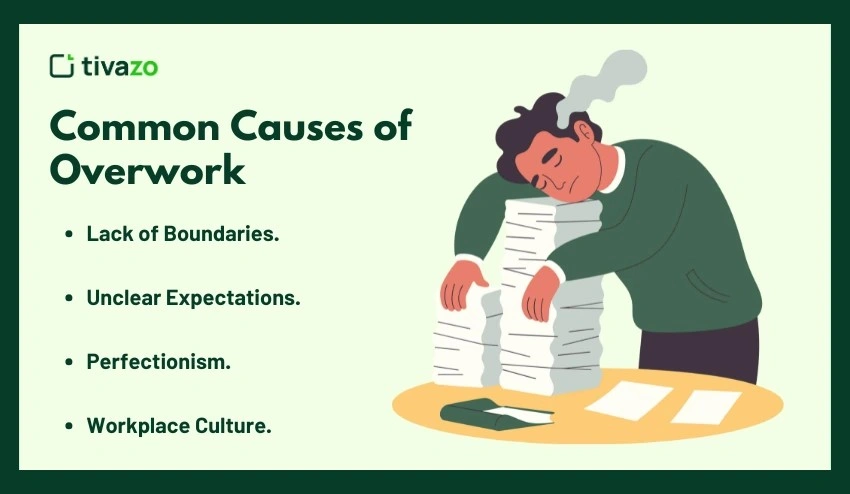
1. Lack of Boundaries
You may not realize how easy it is to work beyond your work hours without established work-life boundaries. Checking for emails, taking on work assignments, or just feeling you need to be “on” will quickly lead you and those around you to feeling burned out.
2. Unclear Expectations
When you don’t have clear goals or expectations, you may also find you are working longer hours, trying to meet vague expectations or unestablished goals. Not knowing will lead to working longer hours to cover your uncertainity.
3. Perfectionism
Some individuals attempt to do an excessive amount of work because they feel that to succeed, they need to do everything perfectly. This way of thinking leads to overworking because there is always a desire to tinker and improve tasks, large and small.
4. Workplace Culture
A workplace culture that values the “hustle” mentality or “always available to work mentality may encourage others to overwork as well. If the organization stipulates long working hours or overtime hours, the employee may feel pressure to do so as well, even if it means sacrificing their well-being.
7 Critical Signs of Overworking
The best way to minimize the negative impacts of overworking is to take deliberate steps to address overworking and create a new response of work habits. It is not just about working less; you must also work smarter, learn new boundaries, and prioritize your own well-being. The following strategies will help you regain your ability to manage your workload and protect your physical well-being. Here are four ways to prevent overworking.
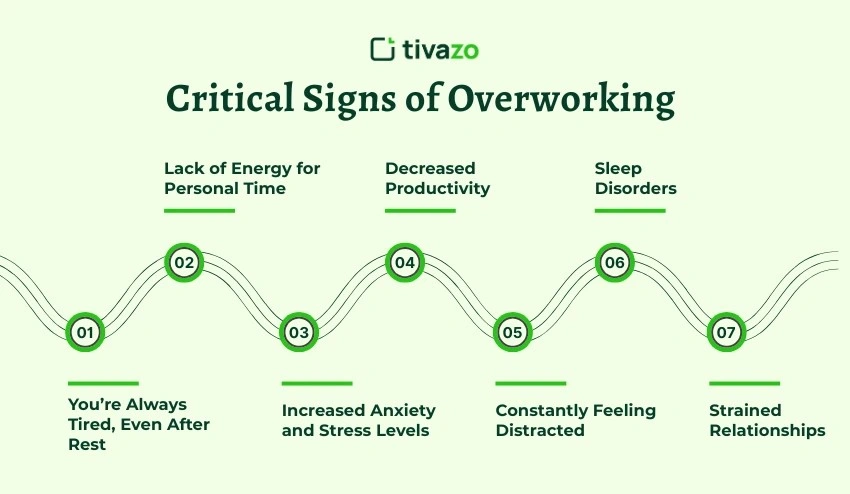
1. You’re Always Tired, Even After Rest
If you feel depleted and exhausted after work and you are unable to recover during weekends, you might be working too much. This chronic overworking leads to fatigue that impairs your productivity.
Tip: Try building better sleep habits or sleep hygiene; it is helpful to establish a consistent bedtime routine, limit screen time before bed, and organize your sleep space to promote sleep.
2. Lack of Energy for Personal Time
If you’re spending your every waking second consuming yourself with work to the point that you’re unable to take time for family, social connections, or even some self-care hobbies, you may have a work-life imbalance.
Tip: Try scheduling personal time and then keeping that time sacred with no exceptions; and prioritize your self-care time by keeping pre-determined breaks, scheduled hobbies, or scheduled leisure time.
3. Increased Anxiety and Stress Levels
When you are overconsuming yourself with work, you are simply adding to your stress levels. Increased anxiety leads to decreased ability to function, as your focus wanders from work to non-work life and back again. Increased anxiety levels may also develop from the constant pressure to stay on top of deadlines and tasks.
Tip: Consider trying stress management techniques, such as social distancing, deep breathing techniques, working in a journal, or even guided meditation.
4. Decreased Productivity Despite Longer Hours
You may find yourself working even longer hours yet accomplishing less. Keep in mind, these indicate you are overworking to the point that it may be affecting your productivity.
Tip: Transition to smart work instead of only hard work. This could mean using ideas such as time-blocking tasks, delegating, or even implementing time tracking systems such as Tivazo, etc.
5. Constantly Feeling Distracted
If you have trouble keeping your attention on one thing at a time and your mind wanders incessantly, these are likely signs of overworking and burning out.
Tip: Work in short sprints with breaks in between, and do your best to eliminate disturbances to keep you focused.
6. Sleep Disorders: One of the Major Warning Signs of Overworking
When you work overtime, you directly impact your sleep quality. Problems such as insomnia and waking up fatigued can be consequences. Over time, inadequate or poor sleep can lead to significant health problems.
Tip: Practice good sleep habits. Try disconnecting from your work at least an hour before you expect to sleep, create a wind-down routine for bedtime, and avoid caffeine consumption as a rule in the late afternoon and into the evening.
7. Strained Relationships and Social Isolation
Overworking usually pushes you away from your friends and family. The elements and lack of being social can affect your mental health and happiness.
Tip: Make time with friends and family a priority. Create boundaries between work and life. Make the weekends and holidays non-working days.
Consequences of Overworking
While overworking may feel like a worthwhile trade-off for success, the results can be damaging in the long run, and the results can be crippling, both personally and professionally. Some of the primary results of overworking are provided below:
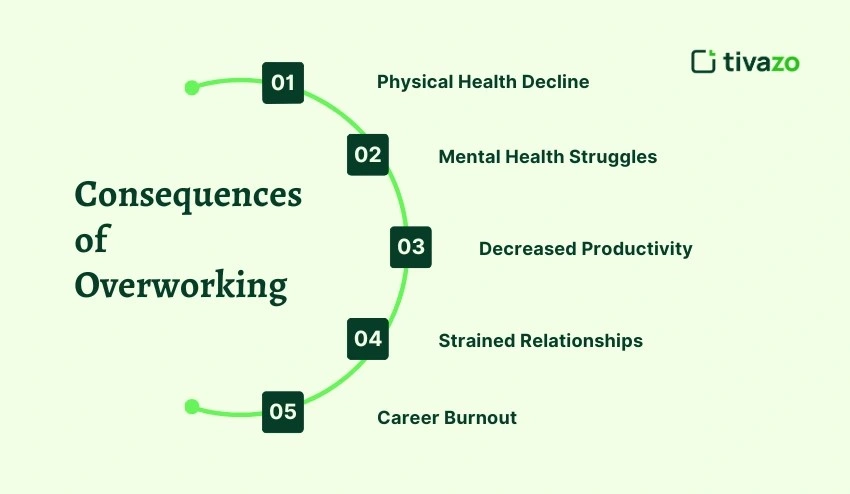
1. Physical Health Decline
Pushing yourself physically beyond capacity can lead to health issues, including heart issues, high blood pressure, chronic fatigue, and a compromised immune system. Insufficient time to rest and recover means the body is denied the opportunity to heal and recover, which raises your susceptibility to illness.
2. Mental Health Struggles
Overworking is key contributor to both anxiety and depression. Living in a state of always being “on” can create hopelessness, loss of control, and burnout. Often unaddressed, stress can lead to a slow deterioration of your emotional resilience and affect your capacity to think clearly.
3. Decreased Productivity
It may seem illogical, but working too much can slow productivity. Too much time spent working will overwhelm your brain, and the quality of your work will decline. Over time you will find yourself more distracted, making more errors, and taking longer to finish tasks.
4. Strained Relationships
When work becomes all consuming, there is often a sacrifice to important personal relationships. Family time, friendships, and even romantic relationships may take a back seat to the demands of working life. Signs of overworking take an emotional toll and, over time, make you more irritable, frustrated, and less communicative with loved ones.
5. Career Burnout
Being overworked (for an extended period) can lead to job burnout. Suddenly, the job that you used to enjoy now feels, like other burdens in your life, like too much of a burden. You may feel less passionate, engaged, or even less motivated to seriously question not just your current work, but your entire career.
Overworking vs. Healthy Work Habits: A Comparison
Before we compare overworking and healthy work habits, it is important to consider what is meant by overworking versus healthy work habits. Often, signs of overworking will feel productive, but eventually you will burn out, your health will suffer, and your productivity or effectiveness will drastically decrease. Healthy work habits give you as an employee focus, promote productivity, and help you to achieve a better work-life balance.
| Aspect | Overworking | Healthy Work Habits |
|---|---|---|
| Work Hours | Extended beyond normal working hours. Often leads to burnout. | Defined work hours with clear start and end times. |
| Mental Health | Increased stress, anxiety, and risk of burnout. | Better mental clarity, reduced stress, and healthier work-life balance. |
| Physical Health | Higher risk of physical problems like fatigue, heart disease, and weakened immunity. | Improved physical well-being with regular breaks, exercise, and rest. |
| Productivity | Decreased productivity over time due to fatigue and stress. | Improved productivity through better focus and rest. |
| Work-Life Balance | Personal life suffers, with little time for family or hobbies. | Balance between work, family, and personal time, leading to overall happiness. |
Prevent Overworking: 4 Key Strategies
The best way to avoid the damaging signs of overworking is to be proactive in identifying and implementing healthier work habits. It is not only about working less – it is about working appropriately, working smarter, establishing your boundaries, and looking after your well-being. These four key strategies to prevent working overtime will help you to regain control of your workload and benefit both your physical and mental health.
1. Set Clear Boundaries
Learn to say no when you can, and also delegate tasks that other people can deal with. You want to make sure you are not doing anything beyond your responsibilities.
2. Prioritize Rest and Recharging
Establish care for oneself as a priority. Take breaks, have vacations, go for walks, or play games as hobbies. If you don’t rest, you will not function at your best.
3. Work Smarter, Not Harder
Use productivity tools like Tivazo to keep track of your work time, identify your energy levels, and evaluate your workflow. When you realize you are wasting time, remove that activity from your work schedule and spend your time on the things that matter, critical tasks.
4. Seek Support
Be open and honest with your boss or HR about your workload. An honest conversation can pave the way for a healthier work environment.
How to Recognize When You’re Overworked
It can be helpful to recognize the signs of overworking early so that you can take preventive measures to avoid long-term health consequences. Often, when the signs come up, they will come up slowly, and we will continue to push through it until something breaks. By recognizing a couple of key signs, you can take measures to avoid burnout.
Here are a few signs of overworking:
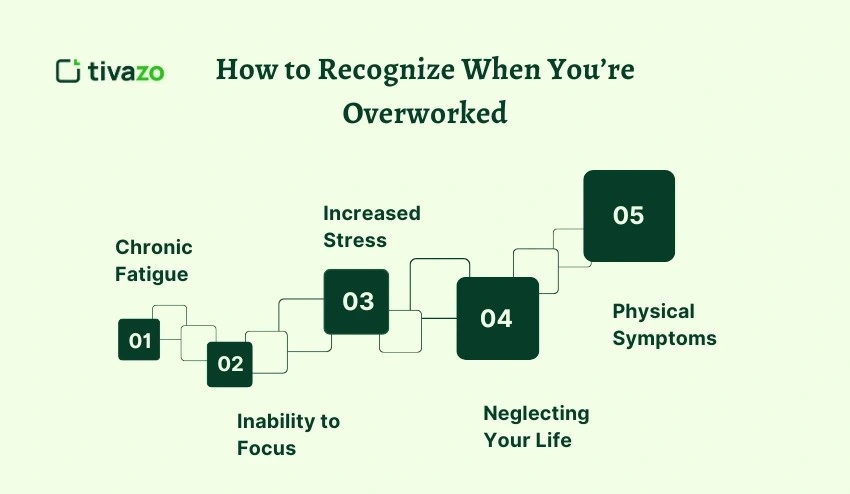
- Chronic Fatigue: Tired, even after having a full night of rest, or feeling exhausted the entire day.
- Inability to Focus: Struggling to focus on what you are working on, making mistakes, and/or spending twice as long doing a task.
- Increased Stress: Constantly worried or anxious about your workload.
- Neglecting Your Life: Other parts of your life, such as relationships or hobbies, are put aside to make room for work.
- Physical Symptoms: Experiencing bodily symptoms, such as headaches, sleep problems, carpal tunnel, or digestive issues.
Conclusion
If we can recognize the signs of overworking early, we can help prevent you from burnout or worse health consequences. Begin to establish boundaries, putting your well-being first and working smarter. Your mental well-being and productivity appreciate it. Remember that your health is your most precious resource take care of it and allow for time to rest and unwind. By putting changes in place today, you can create a better work-life balance that lasts for the long term.
